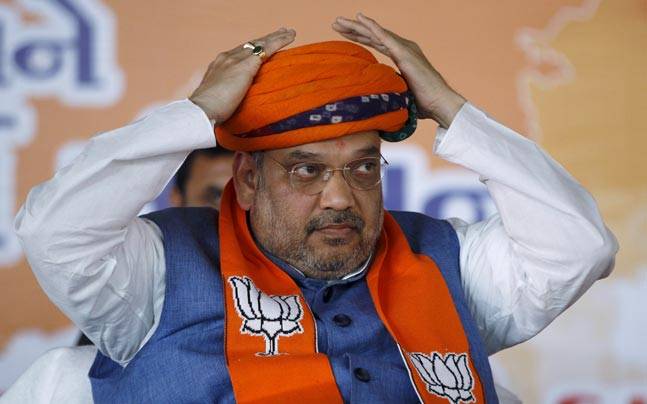On Poll Eve: BJP Without Allies, Ridden With Factionalism
NEW DELHI: On the eve of the forthcoming Assembly elections, the Bharatiya Janata Party seems to be a little shaky and worried. More so, as it is faced with intense factionalism in Uttar Pradesh where it has been unable to declare a Chief Minister candidate, as well as the fact that it is being slowly stripped of all its allies in government.
And perhaps, what is even more discouraging for the BJP no new party seems to be keen to build alliances with it for the forthcoming Assembly elections over the next couple of years.
The Akali Dal is fighting the electoral battle with its back against the wall in Punjab and defeat here would place the party outside the government in the border state. In Uttar Pradesh, all the regional parties are against the BJP with even the Rashtriya Lok Dal leader Ajit Singh preferring to go on his own rather than fight the elections in alliance with the party ruling the centre. Demonetisation has hit the Jat vote badly, and has turned former supporters into opponents of the BJP that Ajit Singh is hoping to cash in on.
The Shiv Sena has broken the alliance in Maharashtra on the eve of the elections to the Municipal Corporations and Zila Parishad. Shiv Sena leader Udhav Thackeray took the decision, according to sources, after consulting all the various ‘shakhas’ of the party that supported the move.
The Sena now is in bitter opposition to its former ally, to the point where it has entered into what sources told The Citizen was a ‘tactical alliance’ with the Congress party in the state for the local elections. As the sources explained, “the Congress wants to survive, and we want to rule and so for both of us the BJP is the main enemy.” Thackeray has been scathing in his comments against the BJP in recent months, as has been the party mouth organ Saamna. The sources said that while the Sena leadership has no real issues with Maharashtra Chief Minister Devendra Fadnavis, the differences with BJP President Amit Shah had reached an irretrievable point.
Despite Prime Minister Narendra Modi, the BJP is struggling to hold its base in several states that it had come to regard as its own. In the lead is Gujarat where there is deep worry within the BJP ranks about the impact of Hardik Patel and his Pattidar support base on the ruling party that he had once been part of, or at least openly supported.
In Jammu and Kashmir, the Peoples Democratic Party has still not become a member of the ruling National Democratic Alliance, at least technically. Mehbooba Mufti has been resisting pressure from within her party to resign, with the PDP and the BJP finding it difficult to function on an even keel. Today Mufti’s comments on Article 370 were expunged the Assembly Speaker, in what is an open crossing of swords between the two allies in state government.
In Bihar the little effort by Chief Minister Nitish Kumar to reach out to PM Modi and the BJP seems to have fallen by the wayside over joint programs like the human chain that the state government was organising. Since then there have been sharp exchange of words, with sources pointing that the grand alliance was strong and stable as before.
In Tamil Nadu, despite PM Modi’s efforts to win over the new AIADMK leadership, the ban on Jallikattu and the protests on Marina Beach targeted the BJP as well with speakers warning of the effort to swamp Tamil identity with north Indian nationalism. Slogans against the BJP as well as PM Modi were raised leading New Delhi to dub the protests anti-national. The AIADMK had to come out in support of the protestors and a delegation of party MPs met President Pranab Mukherjee on the issue. The gulf between the BJP and AIADMK has widened however, with the delegation led by senior party leader M.Thambidurai unable to get an audience with the Prime Minister despite waiting for three days in the capital. Thambidurai later told reporters that it was the responsibility of the PM to meet with the delegation of senior AIADMK leaders and “we are leaving with a heavy heart.”
West Bengal Chief Minister Mamata Banerjee is in open opposition to the BJP over demonetisation in particular. She had been very vocal during her visits to Delhi, and her party MPs have no hesitation in pointing out that after her senior leaders were ‘targeted’ Banerjee is not prepared to shake a hand.
In UP, the factionalism has prevented the party from declaring a CM candidate. The old guard of leaders who had been very close to former PM Atal Bihar Vajpayee remain opposed to Shah, and reports suggest that none of them are keen to cooperate in the campaigning. Besides Shah has created his own team and tends to rely on them to the exclusion of most else.
Sources claimed that the ‘isolation’ of the BJP has started again, with victory thus crucial for the party in UP and Punjab. Defeat will hasten the process, the sources said, pointing out that no regional party was willing to tie its coattails to those of the BJP.





